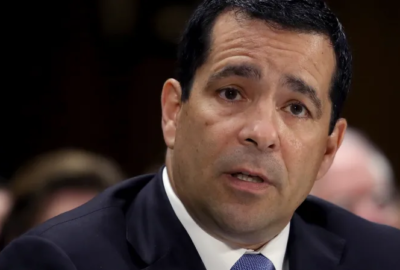
Post-election firings and resignations have begun
In today's Federal Newscast: Federal agencies are starting to experience firings and resignations. DoD is walking the walk, to the tune of nearly $10 Billion do...
To listen to the Federal Newscast on your phone or mobile device, subscribe in PodcastOne or Apple Podcasts. The best listening experience on desktop can be found using Chrome, Firefox or Safari.
- A leadership shakeup is underway at the US Agency for International Development. Bonnie Glick is out as USAID’s deputy administrator. Her last day was Friday. It’s the same day that John Barsa’s term as acting USAID administrator expired under the Federal Vacancies Reform Act. Glick’s departure makes room for Barsa to serve now as the USAID acting deputy administrator. The agency says he will continue to lead the agency in this new capacity. The USAID leadership shakeups are the first of what could be many more during the upcoming presidential transition.
- The top official overseeing the nation’s nuclear weapons stockpile has resigned. Lisa Gordon-Hagerty has led the National Nuclear Security Administration for a little over two years. She was the first woman to hold the job. Her career started at one of NNSA’s labs 30 years ago, and her departure was reportedly not of her own volition. James Inhofe, the Republican chairman of the Senate Armed Services Committee says she was effectively fired by Energy Secretary Dan Brouillette. The position of NNSA has historically been seen as a nonpartisan one, even though the job is a political appointment. For the time being, the agency will be led by Dr. William Bookless. (Federal News Network)
- The Defense Department is not just talking about driving down costs across the department, it is saving close to $10 billion dollars a year. The Defense Information Systems Agency has been on a mission the last five years to reduce the cost of the services it provides while increasing their value. Chris Barnhurst, DISA’s comptroller, is not quite ready to roll out the mission accomplished banner, but he says the results are real. DISA spends about $8 billion dollars a year through its working capital fund and through this cost savings effort it has returned $1.9 billion dollars to the services and agencies over the last five years. Meanwhile, DISA also has increased network capacity by 157% and server operations by 200%.
- At 245 years, the Army has a lot of history. Now people will be able to see it in person. The Army chose this coming Wednesday, Veterans Day, to open the doors to the National Museum of the U.S. Army at Fort Belvoir Virginia. Ceremonies, streamed online, will start at 2 p.m. Visitors must get timed tickets for the otherwise free admission. The stainless-steel building, designed by Skidmore Owings and Merrill, encompasses 185,000 sq. ft., with nearly 1,400 artifacts in 11 galleries. Fundraising was by the Army Historical Foundation.
- Agencies looking to buy Salesforce software from the governmentwide blanket purchase agreement will have to get their orders in by December 20 or find a new contract vehicle. GSA announced the five-year-old BPA is expiring in December. A future follow-on contract is up in the air as GSA says it is conducting market research, a request for information, agency and vendor outreach before deciding on moving forward with another Salesforce BPA. Bloomberg Government reports agencies spent about $370 million dollars through the contract since GSA awarded it in 2015.
- The Census Bureau gave an update on 2020 data processing. Deputy Census Director Ron Jarmin said the bureau has not uncovered anything yet that would suggest the decennial census data is not up to agency standards. The bureau faced a time crunch from the COVID-19 pandemic, but Jarmin said enumerators knocking on doors were nearly twice as efficient this year than they were a decade ago. The bureau also used pay and bonus incentives to get enumerators to work more than the average 19 hours per week.
- Federal retirees enrolled in Medicare Part B will pay more in 2021. The Centers for Medicare and Medicaid Services have released premiums and deductible rates for next year. The standard monthly premium for enrollees will be slightly more than $148 dollars, an increase of nearly $4 dollars. The annual deductible for beneficiaries will be just over $200 dollars, an increase of $5 dollars. Congress adjusted Part B premiums and deductibles in the most recent continuing resolution.
- The Energy Department is offering industry professionals a year-long fellowship to work with its top national and cybersecurity experts. The Operational Technology Defender Fellowship looks to give the energy sector a closer look at how agencies defend this critical infrastructure from cyber attacks. The fellowship is led by the Idaho National Laboratory and the Foundation for Defense of Democracies’ Center for Cyber and Technology Innovation. The idea for the fellowship stems from a recommendation made by the Cyberspace Solarium Commission.
- Work continues on the Trump administration’s Trusted Workforce 2.0 initiative. The Defense Counterintelligence and Security Agency is developing new services to help agencies implement continuous vetting. The new service will give agencies access to automated records checks, alerts and real-time threat analysis. The Office of Personnel Management and Office of the Director of National Intelligence are also working on a new federal personnel vetting core doctrine. The doctrine is supposed to describe the core principles government will use to establish trust with employees and contractors.
- The Department of Labor published a rule that codifies two formal notices that it uses when it finds potential violations of an executive order aimed to resolve potential employment discrimination violations. The rule, from the Office of Federal Contract Compliance Programs, also recognizes the availability of voluntary conciliation agreements early in the resolution process. The notices provide federal contractors an explanation of the agency’s preliminary findings of discrimination and gives them a chance to respond. The final rule will help OFCCP continue increasing the number of contractors that the agency evaluates and focuses on resolving stronger cases of potential discrimination.
Copyright © 2024 Federal News Network. All rights reserved. This website is not intended for users located within the European Economic Area.
Peter Musurlian
Peter Musurlian is a producer at Federal News Network.
Follow @PMusurlianWFED
Related Stories
(AP Photo/Tony Gutierrez)

No ‘hard stop’ for 2020 census if data processing runs past statutory deadline




